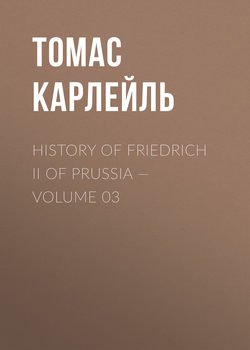History of Friedrich II of Prussia — Volume 03

Реклама. ООО «ЛитРес», ИНН: 7719571260.
Оглавление
Томас Карлейль. History of Friedrich II of Prussia — Volume 03
BOOK III. — THE HOHENZOLLERNS IN BRANDENBURG. - 1412-1718
Chapter I. — KURFURST FRIEDRICH I
Chapter II. — MATINEES DU ROI DE PRUSSE
Chapter III. — KURFURST FRIEDRICH II
Chapter IV. — KURFURST ALBERT ACHILLES, AND HIS SUCCESSOR
JOHANN THE CICERO IS FOURTH KURFURST, AND LEAVES TWO NOTABLE SONS
Chapter V. — OF THE BAIREUTH-ANSPACH BRANCH
TWO LINES IN CULMBACH OR BAIREUTH-ANSPACH: THE GERA BOND OF 1598
THE ELDER LINE OF CULMBACH: FRIEDRICH AND HIS THREE NOTABLE SONS THERE
FRIEDRICH'S SECOND SON, MARGRAF GEORGE OF ANSPACH
Chapter VI. — HOCHMEISTER ALBERT, THIRD NOTABLE SON OF FRIEDRICH
Chapter VII. — ALBERT ALCIBIADES
Chapter VIII. — HISTORICAL MEANING OF THE REFORMATION
Chapter IX. — KURFURST JOACHIM I
Chapter X. — KURFURST JOACHIM II
JOACHIM GETS CO-INVESTMENT IN PREUSSEN
JOACHIM MAKES "HERITAGE-BROTHERHOOD" WITH THE DUKE OF LIEGNITZ
Chapter XI. — SEVENTH KURFURST, JOHANN GEORGE
Chapter XII. — OF ALBERT FRIEDRICH, THE SECOND DUKE OF PREUSSEN
OF DUKE ALBERT FRIEDRICH'S MARRIAGE: WHO HIS WIFE WAS, AND WHAT HER POSSIBLE DOWRY
MARGRAF GEORGE FRIEDRICH COMES TO PREUSSEN TO ADMINISTER
Chapter XIII. — NINTH KURFURST, JOHANN SIGISMUND
HOW THE CLEVE HERITAGE DROPPED, AND MANY SPRANG TO PICK IT UP
THE KAISER'S THOUGHTS ABOUT IT, AND THE WORLD'S
Chapter XIV. — SYMPTOMS OF A GREAT WAR COMING
FIRST SYMPTOM; DONAUWORTH, 1608
SYMPTOM THIRD: A DINNER-SCENE AT DUSSELDORF, 1613: SPANIARDS AND DUTCH SHOULDER ARMS IN CLEVE
SYMPTOM FOURTH, AND CATASTROPHE UPON THE HEELS OF IT
WHAT BECAME OF THE CLEVE-JULICH HERITAGE, AND OF THE PREUSSEN ONE
Chapter XV. — TENTH KURFURST, GEORGE WILHELM
Chapter XVI. — THIRTY-YEARS WAR
SECOND ACT, OR EPOCH, 1624-1629. A SECOND UNCLE PUT TO THE BAN, AND POMMERN SNATCHED AWAY
THIRD ACT, AND WHAT THE KURFURST SUFFERED IN IT
Chapter XVII. — DUCHY OF JAGERNDORF
DUKE OF JAGERNDORF, ELECTOR'S UNCLE, IS PUT UNDER BAN
Chapter XVIII. — FRIEDRICH WILHELM, THE GREAT KURFURST, ELEVENTH OF THE SERIES
WHAT BECAME OF POMMERN AT THE PEACE; FINAL GLANCE INTO CLEVE-JULICH
THE GREAT KURFURST'S WARS: WHAT HE ACHIEVED IN WAR AND PEACE
Chapter XIX. — KING FRIEDRICH I. AGAIN
HOW AUSTRIA SETTLED THE SILESIAN CLAIMS
HIS REAL CHARACTER
Chapter XX. — DEATH OF KING FRIEDRICH I
THE TWELVE HOHENZOLLERN ELECTORS
GENEALOGICAL DIAGRAM: THE TWO CULMBACH LINES
Отрывок из книги
Burggraf Friedrich, on his first coming to Brandenburg, found but a cool reception as Statthalter. ["Johannistage" (24 June) "1412," he first set foot in Brandenburg, with due escort, in due state; only Statthalter (Viceregent) as yet: Pauli, i. 594, ii. 58; Stenzel, Geschichte des Preussischen Staats (Hamburg, 1830, 1851), i. 167-169.] He came as the representative of law and rule; and there had been many helping themselves by a ruleless life, of late. Industry was at a low ebb, violence was rife; plunder, disorder everywhere; too much the habit for baronial gentlemen to "live by the saddle," as they termed it, that is by highway robbery in modern phrase.
The Towns, harried and plundered to skin and bone, were glad to see a Statthalter, and did homage to him with all their heart. But the Baronage or Squirearchy of the country were of another mind. These, in the late anarchies, had set up for a kind of kings in their own right: they had their feuds; made war, made peace, levied tolls, transit-dues; lived much at their own discretion in these solitary countries;—rushing out from their stone towers ("walls fourteen feet thick"), to seize any herd of "six hundred swine," any convoy of Lubeck or Hamburg merchant-goods, that had not contented them in passing. What were pedlers and mechanic fellows made for, if not to be plundered when needful? Arbitrary rule, on the part of these Noble Robber-Lords! And then much of the Crown-Domains had gone to the chief of them,—pawned (and the pawn-ticket lost, so to speak), or sold for what trifle of ready money was to be had, in Jobst and Company's time. To these gentlemen, a Statthalter coming to inquire into matters was no welcome phenomenon. Your EDLE HERR (Noble Lord) of Putlitz, Noble Lords of Quitzow, Rochow, Maltitz and others, supreme in their grassy solitudes this long while, and accustomed to nothing greater than themselves in Brandenburg, how should they obey a Statthalter?
.....
The good Alchemist died,—performed his last sublimation, poor man,—six or seven years before his Brother Friedrich; age then sixty-three. [14th November, 1464.] Friedrich, with his Iron Teeth and faculties, only held out till fifty-eight,—10th February, 1471. The manner of his end was peculiar. In that War with Pommern, he sat besieging a Pomeranian town, Uckermunde the name of it: when at dinner one day, a cannon-ball plunged down upon the table, [Michaelis, i. 303.] with such a crash as we can fancy;—which greatly confused the nerves of Friedrich; much injured his hearing, and even his memory thenceforth. In a few months afterwards he resigned, in favor of his Successor; retired to Plassenburg, and there died in about a year more.
Casimir died in 1527, age then towards fifty. For the last dozen years or so, when the Father's malady became hopeless, he had governed Culmbach, both parts of it; the Anspach part, which belonged to his next brother George, going naturally, in almost all things, along with Baireuth; and George, who was commonly absent, not interfering, except on important occasions. Casimir left one little Boy, age then only six, name Albert; to whom George, henceforth practical sovereign of Culmbach, as his Brother had been, was appointed Guardian. This youth, very full of fire, wildfire too much of it, exploded dreadfully on Germany by and by (Albert ALCIBIADES the name they gave him); nay, towards the end of his nonage, he had been rather sputtery upon his Uncle, the excellent Guardian who had charge of him.
.....